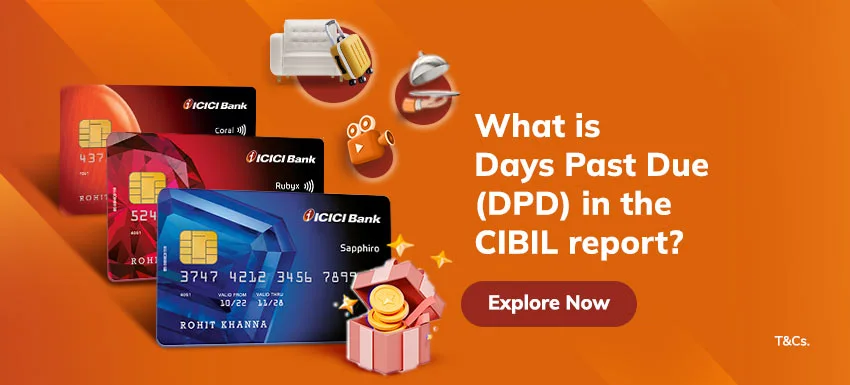THE
ORANGE
HUB
What is Days Past Due (DPD) in the CIBIL report?

What does Days Past Due (DPD) stand for in a CIBIL report?
Days Past Due (DPD) is a significant parameter within your CIBIL report, shedding light on your financial responsibility and payment patterns. This is one of the key metrics that illustrates the days a borrower exceeds the due date for loan EMIs or Credit Card payments.
In this comprehensive guide, we will dig deeper into DPD, unravelling its calculation methods, exploring its significance and delving into its implications for your overall credit health.
What is DPD and what impact does it have on your financial health?
Days Past Due (DPD) in a CIBIL report serves as a key indicator, offering a snapshot of your credit payment behaviour. DPD denotes the period during which a loan EMI or Credit Card payment surpasses its due date, serving as an indicator of potential defaults or delays in payments.
It reflects your financial discipline, portraying how many days you have delayed payments beyond the prescribed due date. The lower the DPD values, the more favourably it reflects on your credit profile, contributing positively to your financial health. Conversely, high DPD values act as cautionary flags, signaling delayed payments that can impact your credit score and overall creditworthiness.
Understanding the DPD calculation method
DPD essentially tallies the days your loan EMI or Credit Card payment has missed its deadline. Simplifying it, if your Credit Card bill is due on the 15th and you pay on the 17th, your DPD is 2. If it's the 20th, it becomes 5.
If you miss a payment, your DPD skyrockets to 15 or more, depending on when you settle the dues.
Remarkably, even a one-day delay matters. CIBIL logs your DPD monthly based on all your loan and Credit Card payments. Why does it matter? A soaring DPD has a detrimental impact on your credit score. Exceeding 30-60 days marks it as a significant default, causing your score to drop by 50-300 points or possibly even more, contingent on the gravity of the delay.
Elements of DPD and what each value implies
XXX as DPD value: Indicates a safe value, revealing a failure on the part of the bank or lender to update data
000 as DPD value: Another secure value, denoting no outstanding payments left
STD as DPD value: Reflects that dues are pending for less than 90 days. It's generally considered negative but not as severe as other categories.
Note: Any DPD value other than XXX or 000 is seen negatively. While STD (up to 90 days) is less severe, anything beyond that indicates a more critical situation. Banks often categorise anything overdue by more than 90 days as NPA or Non-Performing Assets
SUB as DPD value: Represents an account that has remained at the NPA stage for less than 12 months
DBT as DPD value: Indicates an account that has remained in the SUB (sub-standard) category for a duration of 12 months
LSS as DPD value: Points to an account where a loss has been identified and is no longer considered collectable. It is a critical stage where the account has incurred irrecoverable losses.
How to improve your credit score with a high DPD
If you find a high DPD in your CIBIL report, taking proactive steps can help improve your credit score. Here are effective ways to enhance your creditworthiness:
1. Timely payments
Ensure all payments are made within the due date and outstanding dues settled within 90 days. Timely payments are crucial in gradually improving your DPD and overall credit score.
2. Credit Utilisation Ratio
Maintain a healthy Credit Utilisation Ratio using only a fraction of your allotted credit limit. Ideally, this ratio should be below 30%. A lower ratio signals responsible financial management, positively influencing your credit score.
3. Error reporting
Thoroughly review your credit report for any inaccuracies contributing to a high DPD. Report any errors promptly to the respective credit bureau's Customer Care. Rectifying these inaccuracies is vital in preventing unwarranted negative impacts on your credit score.
4. Active Credit Accounts
Keep your positive credit accounts active, showcasing your consistent financial discipline. Lenders view active, well-managed credit accounts as indicators of your commitment to repaying future debts responsibly.
5. Maintain a good credit history
Cultivate a positive credit history by consistently making on-time payments, managing credit utilisation and maintaining a good financial standing. A robust credit history bolsters your creditworthiness over time.
The role of online Credit Card payments in DPD management
Managing your DPD becomes more accessible with online Credit Card payments. These transactions help improve your credit score by ensuring you pay on time, improving your DPD. Online payments are convenient and encourage a disciplined financial approach, contributing to a positive credit history. Using this method, you can navigate DPD challenges, strengthen your creditworthiness and pave the way for a healthier financial future.
Conclusion
Days Past Due (DPD) is a critical compass guiding your financial journey. Mastering its dynamics, the profound understanding of its implications and the strategic measures available for effective management become imperative for cultivating a robust credit profile.
Regular monitoring of DPD-informed financial decision-making and the seamless integration of online Credit Card payment options form a holistic approach to financial well-being. By embracing these proactive measures, you can adeptly navigate the complex terrain of credit, ensuring your financial health and stability.
Scroll to top











